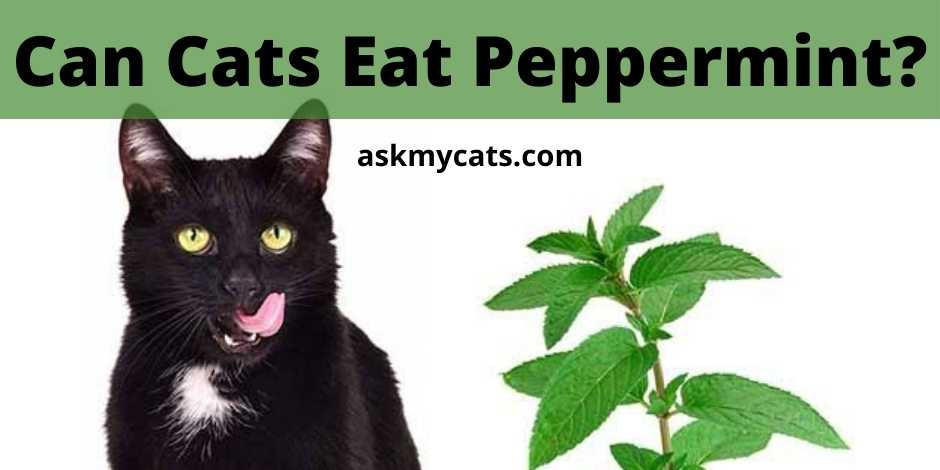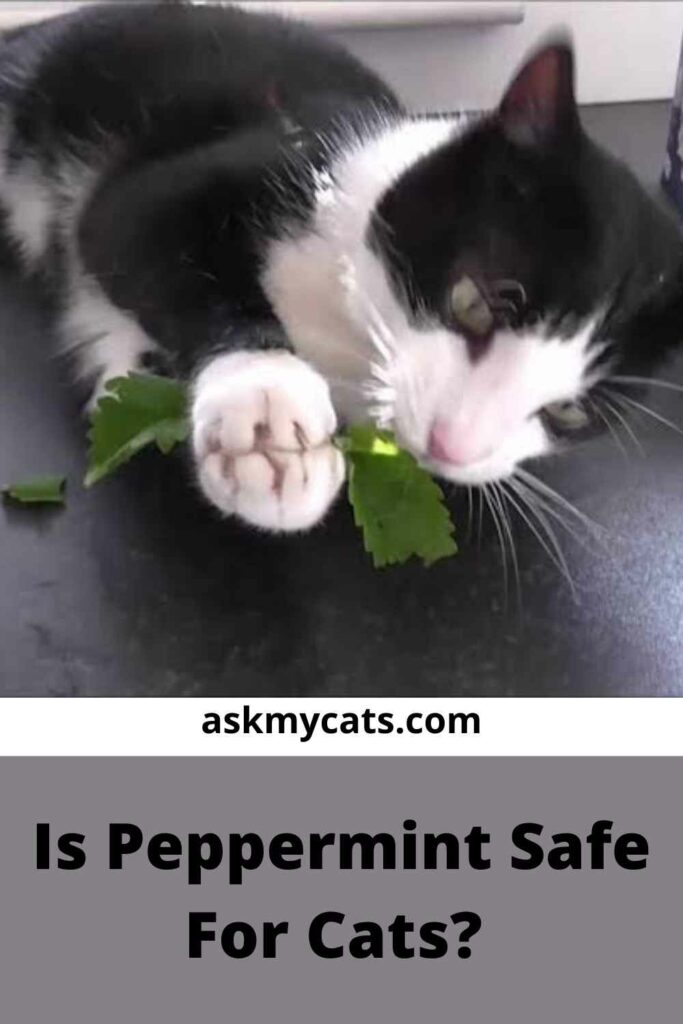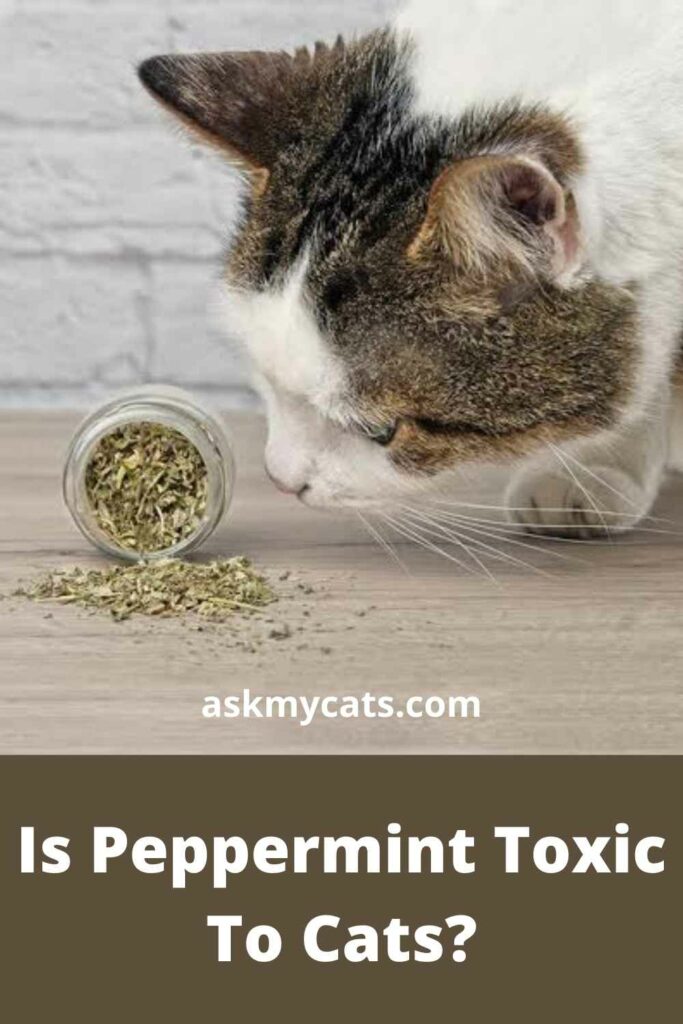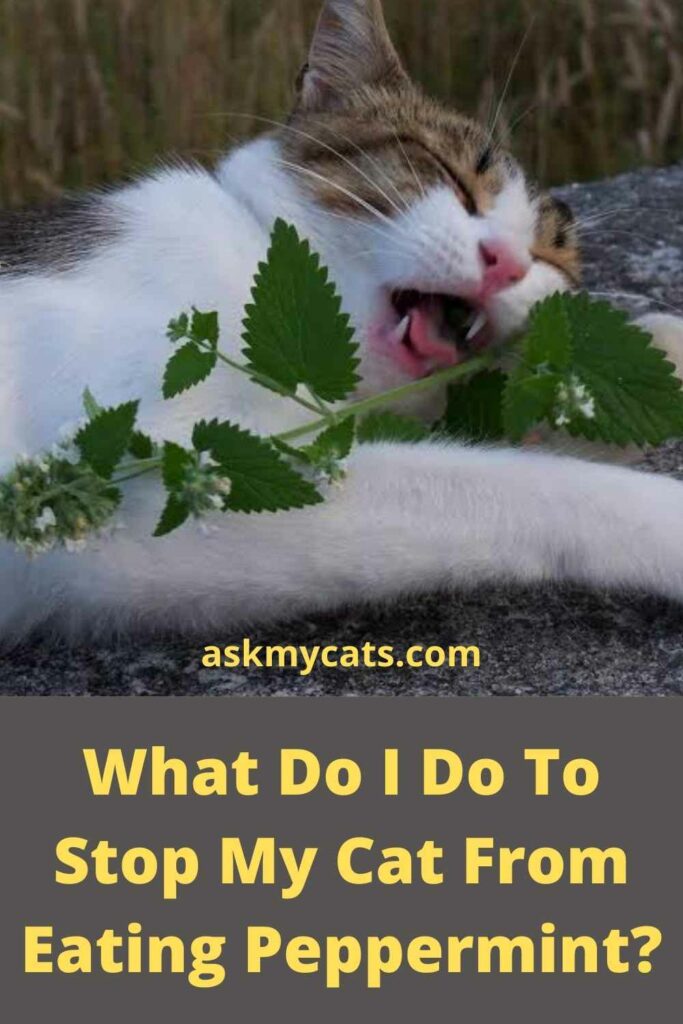Cats are independent creatures who can fit themselves into the most inconvenient of spaces. As a result, it’s critical to understand which houseplants are safe for your cat and which are not.
To answer your question, no, cats cannot eat peppermint. Cats should avoid peppermint plants, as well as any other mint plant types. Cats are poisoned by the essential oils found in these plants.
Regrettably, this implies that you must be quite selective about the mint plants you keep in your home.
If you want to know more about the effects of peppermint on your feline, keep reading!


Give Your Cat the Perfect Day
Get the Free Ebook!
Do Cats Like Peppermint Or Hate It?
Keep in mind that cats are inquisitive creatures, and even simple substances such as peppermint might be enticing to them.
Peppermint and other kinds of mint, contrary to common perception, are all potentially harmful to cats and other pets. These plants contain essential oils that should not be consumed.
Mint poisoning can be caused by consuming excessive quantities of peppermint. Diarrhea, vomiting, gastrointestinal discomfort, and overall weakness are all common symptoms.
Because cats are attracted to the fragrance of mint, keeping peppermint plants inside is not a smart idea. If you want to grow your own mint, leave it outside where your cat won’t be able to get to it.
Is Peppermint Safe For Cats?

Cats should avoid peppermint plants as it is not safe for them.
Peppermint contains Salicylate, which is toxic to cats, thus many cats dislike the smell. Unfortunately, because the peppermint plant contains chemicals like Nepetalactone, which is the primary component in Catnip, certain cats are drawn to it.
Peppermint plants contain essential oils that are toxic to cats.
The following are symptoms of mint poisoning:
- Vomiting
- Diarrhea
- Reaction to allergens
- Gastrointestinal disturbance
- Anaphylaxis
- Nausea
- Weakness
If you notice any of these symptoms persisting after your cat has ingested peppermint plant, take her to a veterinarian.
Is Peppermint Toxic To Cats?

While peppermint isn’t strictly poisonous, it is extremely harmful to cats. It is harmful to cats because of the effects it has on their liver.
The glucuronosyltransferase enzyme, which is present in humans and other animals, is required to break down the components of essential oils. Cats, once again, lack this natural enzyme.
When the liver is unable to recognize and remove a chemical, it retains it since it is unsure what to do with it. This results in the cat being poisoned and perhaps dying.
Peppermint oil also includes phenols and ketones, which cats are particularly sensitive to. The fact that their liver is unable to remove them and instead retains them a major issue.
The poison builds up over time, resulting in a rapid or delayed death depending on the cat’s individual system. Because each cat’s system is stronger or weaker, there is no way to predict how long it will take to die.
The neurological system will break down and damage the liver, leading it to finally fail and ruin the cat’s system, resulting in death.
Can Cats Eat Peppermint Plant?
Peppermint plants produce essential oils, which are potentially toxic to cats. The American Society for the Prevention of Cruelty to Animals (ASPCA) lists garden mint as a toxin for cats, although it’s essential to remember that cats have varied tolerances.
To put it another way, some cats are more susceptible to damage from mint than others. Mint must also be taken in extremely high quantities to be toxic.
This implies that although some cats will be okay after a smidgeon of mint, others may display symptoms of mint poisoning. Therefore, you should keep your cat away from peppermint plants.
What Happens When Cats Eat Peppermint?
We can promise you that nothing positive will happen if your cat eats peppermint.
Peppermint smells alone can generally induce aspiration pneumonia in cats owing to the strong perfume of peppermint breaching their delicate neurological system.
Symptoms will emerge as a result of this. Fever, a rapid rise in heart rate, and difficult breathing are all signs to check for. After breathing the peppermint, they will usually start coughing or sneezing up some hardened drops.
Peppermint will make your cat sick fairly instantly. Peppermint is readily absorbed through a cat’s skin, despite its odor.
This is due to cats’ fragile, thin skin, which allows virtually any chemical to quickly absorb into their system and bloodstream.
The liver, gastrointestinal system, and central nervous system will all be compromised after that. If you suspect your cat of having mint poisoning, immediately take her to a veterinarian.
Can Cats Eat Peppermint Tea?
Yes, a few drops of peppermint tea can help your cat’s stomach.
Some diluted herbal teas are safe for both cats and people to drink, and in some circumstances, they can help pets and their owners relax.
Chamomile, valerian, peppermint, apples, and other healthy fruits are just a few options for your little kitten.
Before offering your cat your tea, check the ingredients to make sure it doesn’t include any strong oils or tastes that might irritate their stomach. If your cat is on any medications, do some research to ensure that none of the components in your tea may cause an adverse reaction.
What To Do If My Cat Licked Peppermint Oil?
If your cat just licked a tiny amount of peppermint oil, she should be okay.
However, peppermint oil is harmful to your cat’s health. We recommend visiting a veterinarian to be on the safe side.
Can Cats Eat Peppermint Oil?
No, cats should not eat peppermint oil. Because peppermint oil is so potent, it should be kept away from cats at all times.
Cats will be harmed by peppermint oil because, like other essential oils, it is poisonous to them. Peppermint oil should never be used on a cat since the toxins might be absorbed through their thin skin.
Peppermint oil has been found to be deadly to cats in a number of scientific investigations. The American Society for the Prevention of Cruelty to Animals, or ASPCA, also strongly advises pet owners not to use peppermint oil on their furry children.
When utilized, peppermint oil has characteristics that are widely recognized for repelling fleas, but this does not imply it must be used. There are alternative ways to keep fleas away from your cat without placing it in harm’s way.
Can The Smell Of Peppermint Hurt Cats?
That minty fresh scent that makes you feel clean and tingling won’t make your feline companions feel the same way. Peppermint oil, which is an essential oil, is particularly irritating to cats’ neurological systems.
If your cat inhales mint oil, she might get aspiration pneumonia. Fever, quick or laborious breathing, and a high heart rate are all symptoms. Coughing or sneezing out droplets of the inhalant that caused pneumonia, such as mint oil, is common in cats.
Ingesting peppermint, or any other form of mint, is hazardous to cats. Mints are poisonous to cats and should be kept away from them at all times.
Can Cats Eat Peppermint Candy Canes?
Peppermint candy canes are not harmful to cats, so you can rest easy. Cats may lick or chew candy canes to mitigate their curious nature. They will end up getting disappointed when they realize it is too chilly for their taste buds.
However, just because something isn’t poisonous doesn’t imply it’s healthy. Most candy canes include high amounts of fructose corn syrup. This can cause digestive problems in cats, such as flatulence and diarrhea.
It is okay if your cat licks a peppermint candy cane on a rare occasion as it is not too harmful for them.
Can Cats Eat Peppermint Leaves?
No, cats should not eat peppermint leaves, Peppermint plants are rich in essential oils, which are very poisonous to cats.
As a result, make sure your cat doesn’t eat the mint leaves or any other plant parts.
Is Peppermint Safe To Diffuse Around Cats?
Many essential oils are harmful to cats, including peppermint boil. Whether applied to the skin, utilized in diffusers, or licked up in the event of a spill, they are hazardous.
Diffusers that generate a pleasant, nose-pleasing scent may appear harmless, but they can be dangerous since they employ water vapor to disperse small oil droplets into the air. When diffused oils are inhaled in a small space over an extended length of time, they are known to have harmful respiratory effects on people and pets.
It’s crucial to remember that cats are far more sensitive to smells than humans. What you may think is a little, pleasant odor might be overpowering and dangerous to an animal.
Severe liver damage, liver failure, respiratory failure, convulsions, and even death can occur as a result of exposure. Therefore, avoid diffusing peppermint oil near your cat.
What Do I Do To Stop My Cat From Eating Peppermint?
Try following these steps to prevent your cat from eating peppermint:

1. Keep Mint Snacks Away From Your Feline
If your cat enjoy mint candies or meals, it’s vital to keep those items out her reach. Candy dishes should be stored in the refrigerator or in a cupboard out of reach of your cat.
They can smell mint from a mile away, and the last thing you want is for them to ingest it.
2. Keep Catnip To A Minimum
Catnip is a widely used substance, yet it causes problems for most cat owners.
Because cats are drawn to the minty characteristics of catnip, you may wish to restrict your cat’s access to it. Consider giving children toys that do not already contain the product.
3. Keep An Eye On Your Cat
Peppermint has a distinct effect on each cat. Some cats adore it, while others despise it.
If you burn essential oils in your house, any that contain peppermint are likely to cause an allergic response in your cat. So, with that in mind, keep a close eye on your cat to ensure they are not harmed.
Any plants you bring into the house should be checked for compatibility with your cat’s behavior. Even a smidgeon of mint may make a difference. Remember that any mint ingested by a cat can cause significant gastrointestinal problems, so keep any plants or oils out of reach!
Frequently Asked Questions
Is A Diffuser Safe For Cats?
No, a diffuser is not safe for cats. Because some cats may have trouble breathing effectively with essential oils in the air, it’s best to avoid using diffusers or sprays that make the droplets airborne.
Can You Use Peppermint Oil On Cats For Fleas?
Peppermint oil is an example of an essential oil that is occasionally advised for usage in dogs, particularly for flea control.
Is Menthol Safe For Cats?
Menthol is toxic to cats, and you should avoid giving them menthol-containing items. Because cats are drawn to minty odors, avoid using menthol-containing creams, lotions, or meals if you have a cat.
Final Words
Peppermint, catnip, and other kinds of mint are all potentially harmful to cats and other pets, contrary to common perception. These plants contain essential oils that should not be consumed.
Mint poisoning can occur if a considerable amount of mint is consumed. Due to the fact that cats are drawn to the fragrance of mint, keeping mint plants in the house is not a smart idea. If you want to grow your own mint, leave it outside where your cat won’t be able to get to it.
To minimize inadvertent consumption or inhalation of peppermint, the ASPCA recommends avoiding using peppermint items in places of the house where your cat may get them.
Take your cat to the vet right away if she seems sluggish or unresponsive and you uncover proof that she swallowed or breathed mint.
Mint may not be the ideal plant to cultivate in your home if you have a cat. Instead, try planting one of the cat-friendly plants.
Feel free to drop your doubts regarding your furry friend in the comment section below!
